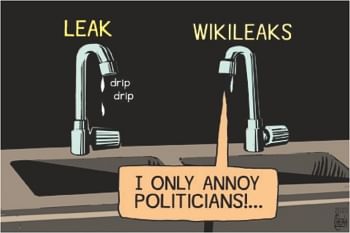| Home - Back Issues - The Team - Contact Us |
 |
| Volume 10 |Issue 35 | September 16, 2011 | |
|
|
Postscript 'Love is a Battlefield' Aasha Mehreen Amin
Politicians have always had a love-hate relationship with the media. Politicians love the media as it is the primary vehicle through which their loud voices can be heard; their real or imaginary accusations against rivals can be aired; and through which their faces can become as familiar as the hottest celebrities. But like all intense relationships, there is a flipside. Things begin to sour when the media gets a little too close for comfort and start digging up all kinds of dirt cleverly swept under the carpet before the guests can arrive. Journalists, politicians unanimously agree even if they are in opposing camps, can be quite a pain in the neck. Their nosey noses tend to sniff out every embarrassing detail so painstakingly hidden in the secret nooks and crannies of the collective official closets. Why, think many an MP, must the media know if they haven't paid their telephone bills for a year, that the chauffeur's mother-in-law and co. are living in the flat allotted to MPs, that they happily sell off their official tax-exempted cars for some extra pocket money? Why do they poke their beaky noses into the business of which relative unfairly got the tender, who got a bit of extra tea money to seal a deal and how corrugated tin meant for cyclone victim's rehabilitation projects ended up in an MP's backyard? To add the cherry on the top, is the devilish monster named Wiki Leaks. They have now created a worldwide fraternity of pesky journalists, leaking out practically every sigh, pause, chuckle and secret dialogue between the country's politicians and foreign officials. Local journalists are having a ball, seeing all their hunches and speculations being confirmed by the release of classified documents procured by this international menace. It must be a part of a conspiracy to foil all conspiracies, the conspirators think. Like any thwarted lover who just can't stand being told they have been quite a cad, politicians react like bratty toddlers rebuked for breaking their own toys, when they are criticised. Usually denial is the most common strategy: 'the media is trying to tarnish the image of the country by exaggerating the faults of the government'; religious extremists do not exist, the JMB is a figment of the media's imagination'; 'law and order is better than before.' Politicians, when in power, also love being secretive with the media. They will throw out journalists from meetings even after inviting them on matters of 'national importance'. They will not reveal details of international agreements until they are signed and tell their own journalists to go and check out foreign websites for information because their own websites are practically non-functional. Sometimes the relationship takes a bitter turn. Like vindictive estranged spouses, they (politicians) resort to a little nastiness -character assassinations, defamation suits, incarceration or just plain bullying. All this could be enough to put off the most ardent of lovers. But not the media. They will stick through this relationship in sickness and health, through thick and thin. Not that they don't enjoy being like the nagging wife, incessantly complaining about leaky taps and inefficient home workers, but that's not really the point. The good news is that even the most turbulent relationship has the potential to reach calmer waters. It's really up to the politicians. When the media criticises the politicians' shortcomings it is actually doing what it is supposed to do. Conversely, the media can also become the most exuberant admirer. All the politicians have to do is one thing: their job.
Copyright
(R) thedailystar.net 2011 |
